- Home
- Alice Walker
The Color Purple Page 11
The Color Purple Read online
Page 11
Thank God (and sometimes Samuel's intervention) this has not happened since we've been here. But the stories Tashi tells are often about such gruesome events that happened in the recent past. And God forbid that the child of a favorite wife should fall ill! That is the point at which even the women's friendships break down, as each woman fears the accusation of sorcery from the other, or from the husband.
Merry Christmas to you and yours, dear Celie. We celebrate it. here on the "dark" continent with prayer and song and a large picnic complete with watermelon, fresh fruit punch, and barbecue!
God bless you,
Nettie
I meant to write you in time for Easter, but it was not a good time for me and I did not want to burden you with any distressing news. So a whole year has gone by. The first thing I should tell you about is the road. The road finally reached the cassava fields about nine months ago and the Olinka, who. love nothing better than a celebration, outdid themselves preparing a feast for the roadbuilders who talked and laughed and cut their eyes at the Olinka women the whole day. In the evening many were invited into the village itself and there was merrymaking far into the night.
I think Africans are very much like white people back home, in that they think they are the center of the universe and that everything that is done is done for them. The Olinka definitely hold this view. And so they naturally thought the road being built was for them. And, in fact, the roadbuilders talked much of how quickly the Olinka will now be able to get to the coast. With a tarmac road it is only a three-day journey. By bicycle it will be even less. Of course no one in Olinka owns a bicycle, but one of the roadbuilders has one, and all the Olinka men covet it and talk of someday soon purchasing their own.
Well, the morning after the road was "finished" as far as the Olinka were concerned (after all, it had reached their village), what should we discover but that the roadbuilders were back at work. They have instructions to continue the road for another thirty miles! And to continue it on its present course right through the village of Olinka. By the time we were out of bed, the road was already being dug through Catherine's newly planted yam field. Of course the Olinka were up in arms. But the roadbuilders were literally up in arms. They had guns, Celie, with orders to shoot!
It was pitiful, Celie. The people felt so betrayed! They stood by helplessly? they really don't know how to fight, and rarely think of it since the old days of tribal wars? as their crops and then their very homes were destroyed. Yes. The roadbuilders didn't deviate an inch from the plan the headman was following. Every hut that lay in the proposed roadpath was leveled. And, Celie, our church, our school, my hut, all went down in a matter of hours. Fortunately, we were able to save all of our things, but with a tarmac road running straight through the middle of it, the village itself seems gutted.
Immediately after understanding the roadbuilders' intentions, the chief set off toward the coast, seeking explanations and reparations.
Two weeks later he returned with even more disturbing news. The whole territory, including the Olinkas' village, now belongs to a rubber manufacturer in England. As he neared the coast, he was stunned to see hundreds and hundreds of villagers much like the Olinka clearing the forests on each side of the road, and planting rubber trees. The ancient, giant mahogany trees, all the trees, the game, everything of the forest was being destroyed, and the land was forced to lie flat, he said, and bare as the palm of his hand.
At first he thought the people who told him about the English rubber company were mistaken, if only about its territory including the Olinka village. But eventually he was directed to the governor's mansion, a huge white building, with flags flying in its yard, and there had an audience with the white man in charge. It was this man who gave the roadbuilders their orders, this man who knew about the Olinka only from a map. He spoke in English, which our chief tried to speak also.
It must have been a pathetic exchange. Our chief never learned English beyond an occasional odd phrase he picked up from Joseph, who pronounces "English"
"Yanglush."
But the worst was yet to be told. Since the Olinka no longer own their village, they must pay rent for it, and in order to use the water, which also no longer belongs to them, they must pay a water tax.
At first the people laughed. It really did seem crazy. They've been here forever. But the chief did not laugh.
We will fight the white man, they said.
But the white man is not alone, said the chief. He has brought his army.
That was several months ago, and so far nothing has happened. The people live like ostriches, never setting foot on the new road if they can help it, and never, ever, looking towards the coast. We have built another church and school. I have another hut.
And so we wait.
Meanwhile, Corrine has been very ill with African fever. Many missionaries in the past have died from it.
But the children are fine. The boys now accept Olivia and Tashi in class and more mothers are sending their daughters to school.
The men do not like it: who wants a wife who knows everything her husband knows? they fume. But the women have their ways, and they love their children, even their girls.
I will write more when things start looking up. I trust God they will.
Your sister,
Nettie
This whole year, after Easter, has been difficult. Since Corrine's illness, all her work has fallen on me, and I must nurse her as well, which she resents.
One day when I was changing her as she lay in bed, she gave me a long, mean, but somehow pitiful look. Why do my children look like you? she asked.
Do you really think they look so much like me? I said.
You could have spit them out, she said.
Maybe just living together, loving people makes them look like you, I said. You know how much some old married people look alike.
Even these women saw the resemblance the first day we came, she said.
And that's worried you all this time? I tried to laugh it off.
But she just looked at me.
When did you first meet my husband? she wanted to know.
And that was when I knew what she thought. She 178 thinks Adam and Olivia are my children, and that Samuel is their father!
Oh, Celie, this thing has been gnawing away at her all these years!
I met Samuel the same day I met you, Corrine, I said. (I still haven't got the hang of saying "Sister" all the time.) As God is my witness, that's the truth.
Bring the bible, she said.
I brought the bible, and placed my hand on it, and swore.
You've never known me to lie, Corrine, I said. Please believe I am not lying now.
Then she called Samuel, and made him swear that the day she met me was the day he met me also.
He said: I apologize for this, Sister Nettie, please forgive us.
As soon as Samuel left the room she made me raise my dress and she sat up in her sickbed to examine my stomach.
I felt so sorry for her, and so humiliated, Celie. And the way she treats the children is the hardest part. She doesn't want them near her, which they don't understand. How could they? They don't even know they were adopted.
The village is due to be planted in rubber trees this coming season. The Olinka hunting territory has already been destroyed, and die men must go farther and farther away to find game. The women spend all their time in the fields, tending their crops and praying.
They sing to the earth and to the sky and to their cassava and groundnuts. Songs of love and farewell.
We are all sad, here, Celie. I hope life is happier for you.
Your sister,
Guess what? Samuel thought the children were mine too! That is why he urged me to come to Africa with them. When I showed up at their house he thought I was following my children, and, soft-hearted as he is, didn't have the heart to turn me away.
If they are not yours, be said, whose are they?
But I had some questi
ons for him, first.
Where did you get them? I asked. And Celie, he told me a story that made my hah- stand on end. I hope you, poor thing, are ready for it.
Once upon a time, there was a well-to-do farmer who owned his own property near town. Our town, Celie. And as he did so well fanning and everything he turned his hand to prospered, he decided to open a store, and try his luck selling dry goods as well. Well, his store did so well that he talked two of his brothers into helping him run it, and, as the months went by, they were doing better and better. Then the white merchants began to get together and complain that this store was taking all the black business away from them, and the man's blacksmith shop that he set up behind the store, was taking some of the white. This would not do. And so, one night, the man's store was burned down, his smithy destroyed, and the man and his two brothers dragged out of their homes in the middle of the night and hanged.
The man had a wife whom he adored, and they had a little girl, barely two years old. She was also pregnant with another child.
When the neighbors brought her husband's body home, it had been mutilated and burnt. The sight of it nearly killed her, and her second baby, also a girl, was born at this time. Although the widow's body recovered, her mind was never the same. She continued to fix her husband's plate at mealtimes just as she'd always done and was always full of talk about the plans she and her husband had made. The neighbors, though not always intending to, shunned her more and more, partly because the plans she talked about were grander than anything they could even conceive of for colored people, and partly because her attachment to the past was so pitiful. She was a good-looking woman, though, and still owned land, but there was no one to work it for her, and she didn't know how herself; besides she kept waiting for her husband to finish the meal she'd cooked for him and go to the fields himself. Soon there was nothing to eat that the neighbors did not bring, and she and her small children grubbed around in the yard as best they could.
While the second child was still a baby, a stranger appeared in the community, and lavished all his attention on the widow and her children; in a short while, they were married. Almost at once she was pregnant a third time, though her mental health was no better. Every year thereafter, she was pregnant, every year she became weaker and more mentally unstable, until, many years after she married the stranger, she died.
Two years before she died she had a baby girl that she was too sick to keep. Then a baby boy. These children were named Olivia and Adam.
This is Samuel's story, almost word for word.
The stranger who married the widow was someone Samuel had run with long before he found Christ. When the man showed up at Samuel's house with first Olivia and then Adam, Samuel felt not only unable to refuse the children, but as if God had answered his and Corrine's prayers.
He never told Corrine about the man or about the children's "mother" because he hadn't wanted any sadness to cloud her happiness.
But then, out of nowhere, I appeared. He put two and two together, remembered that his old running buddy had always been a scamp, and took me in without any questions. Which, to tell the truth, had always puzzled me, but I put it down to Christian charity.
Corrine had asked me once whether I was running away from home. But I explained I was a big girl now, my family back home very large and poor, and it was time for me to get out and earn my own living.
Tears had soaked my blouse when Samuel finished telling me all this. I couldn't begin, then, to tell him the truth. But Celie, I can fell you. And I pray with all my heart that you will get this letter, if none of the others.
Pa is not our pa!
Your devoted Sister,
Nettie
That's it, say Shug. Pack your stuff. You coming back to Tennessee with me.
But I feels daze.
My daddy lynch. My mama crazy. All my little half-brothers and sisters no kin to me. My children not my sister and brother. Pa not pa.
You must be sleep.
For the first time in my life I wanted to see Pa. So me and Shug dress up in our new blue flower pants that match and big floppy Easter hats that match too, cept her roses red, mine yellow, and us dam hi the Packard and glide over there. They put in paved roads all up and down the county now and twenty miles go like nothing.
I saw Pa once since I left home. One day me and Mr.??? was loading up the wagon at the feed store. Pa was with May Ellen and she was trying to fix her stocking. She was bent down over her leg and twisting the stocking into a knot above her knee, and he was standing over her tap-tap-tapping on the gravel with his cane. Look like he was thinking bout hitting her with it.
Mr.??? went up to them all friendly, with his hand stuck out, but I kept loading the wagon and looking at the patterns on the sacks. I never thought I'd ever want to see him again.
Well, it was a bright Spring day, sort of chill at first, like it be round Easter, and the first thing us notice soon as we turn into the lane is how green everything is, like even though the ground everywhere else not wanned up good, Pa's land is warm and ready to go. Then all along the road there's Easter lilies and jonquils and daffodils and all kinds of little early wildflowers. Then us notice all the birds singing they little cans off, all up and down the hedge, that itself is putting out little yellow flowers smell like Virginia creeper. It all so different from the rest of the country us drive through, it make us real quiet. I know this sound funny, Nettie, but even the sun seemed to stand a little longer over our heads.
Well, say Shug, all this is pretty enough. You never said how pretty it was.
It wasn't this pretty, I say. Every Easter time it used to flood, and all us children had colds. Anyhow, I say, us stuck close to the house, and it sure ain't so hot.
That ain't so hot? she ast, as we swung up a long curving hill I didn't remember, right up to a big yellow two story house with green shutters and a steep green shingle roof.
I laughed. Us must have took the wrong turn, I say. This some white person's house.
It was so pretty though that us stop the car and just set looking at it.
What kind of trees all them flowering? ast Shug.
I don't know, I say. Look like peach, plum, apple, maybe cherry. But whatever they is, they sure pretty.
All round the house, all in back of it, nothing but blooming trees. Then more lilies and jonquils and roses clamming over everything.
And all the time the little birds from all over the rest of the county sit up in these trees just going to town.
Finally, after us look at it awhile, I say, it so quiet, nobody home, I guess.
Naw, say Shug, probably in church. A nice bright Sunday like this.
Us better leave then, I say, before whoever it is lives here gits back. But just as I say that I notice my eye is staying on a fig tree it recognize, and us hear a car turning up the drive. Who should be in the car but Pa and some young girl look like his child.
He git out on his side, then go round to open the door for her. She dress to kill in a pink suit, big pink hat and pink shoes, a little pink purse hanging on her arm. They look at our license tag and then come up to the car. She put her hand through his arm.
Morning, he says, when he gits up to Shug's window.
Morning, she says slow, and I can tell he not what she expect.
Anything I can do for you? He ain't notice me and probably wouldn't even if he looked at me.
Shug say, under her breath, Is this him?
I say, Yeah.
What shock Shug and shock me too is how young he look. He look older than the child he with, even if she is dress up like a woman, but he look young for somebody to be anybody that got grown children and nearly grown grandchildren. But then I remember, he not my daddy, just my children daddy.
What your mama do, ast Shug, rob the cradle?
But he not so young.
I brought Celie, say Shug. Your daughter Celie. She wanted to visit you. Got some questions to ast.
He seem to think
back a second. Celie? he say. Like, Who Celie? Then he say, Yall git out and come up on the porch. Daisy, he say to the little woman with him, go tell Hetty to hold dinner. She squeeze his arm, reach up and kiss him on the jaw. He turn his head and watch her go up the walk, up the steps, and through the front door. He follow us up the steps, up on the porch, help us pull out rocking chairs, then say, Now, what yall want?
The children here? I ast.
What children? he say. Then he laugh. Oh, they gone with they mama. She up and left me, you know. Went back to her folks. Yeah, he say, you would remember May Ellen.
Why she leave? I ast.
He laugh some more. Got too old for me, I reckon.
Then the little woman come back out and sit on the armrest of his chair. He talk to us and fondle her arm.
This Daisy, he say. My new wife.
Why, say Shug, you don't look more than fifteen.
I ain't, say Daisy.
I'm surprise your people let you marry.
She shrug, look at Pa. They work for him, she say. Live on his land.
I'm her people now, he say.
I feels so sick I almost gag. Nettie in Africa, I say. A missionary. She wrote me that you ain't our real Pa.
Well, he say. So now you know.
Daisy look at me with pity all over her face. It just like him to keep that from you, she say. He told me how he brought up two little girls that wasn't even his, she say. I don't think I really believed it, till now.
Naw, he never told them, say Shug.
What a old sweetie pie, say Daisy, kissing him on top the head. He fondle and fondle her arm. Look at me and grin.
Your daddy didn't know how to git along, he say. Whitefolks lynch him. Too sad a story to tell pitiful little growing girls, he say. Any man would have done what I done.
Maybe not, say Shug.
He look at her, then look at me. He can tell she know. But what do he care?

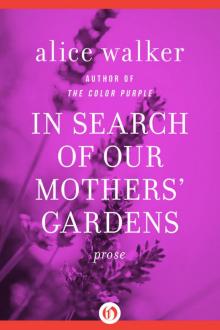 In Search of Our Mothers' Gardens: Prose
In Search of Our Mothers' Gardens: Prose In Love and Trouble: Stories of Black Women: Stories of Black Women
In Love and Trouble: Stories of Black Women: Stories of Black Women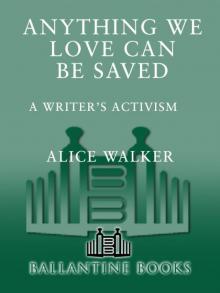 Anything We Love Can Be Saved
Anything We Love Can Be Saved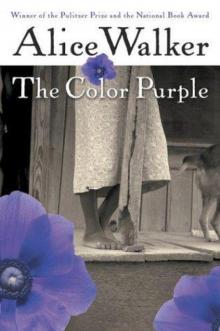 The Color Purple
The Color Purple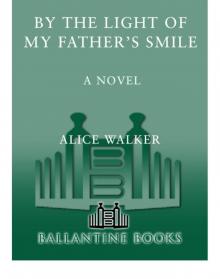 By the Light of My Father's Smile
By the Light of My Father's Smile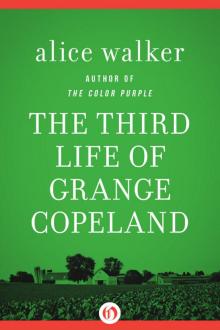 The Third Life of Grange Copeland
The Third Life of Grange Copeland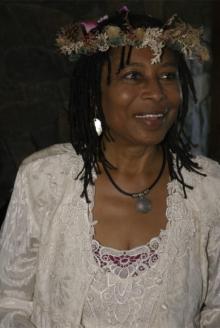 You Can't Keep a Good Woman Down
You Can't Keep a Good Woman Down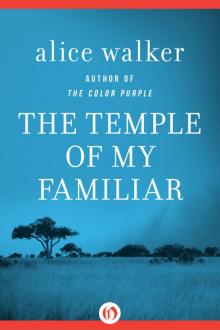 The Temple of My Familiar
The Temple of My Familiar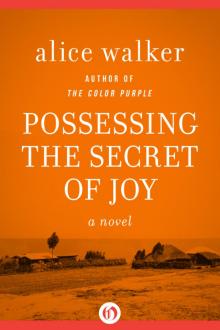 Possessing the Secret of Joy
Possessing the Secret of Joy We Are the Ones We Have Been Waiting For
We Are the Ones We Have Been Waiting For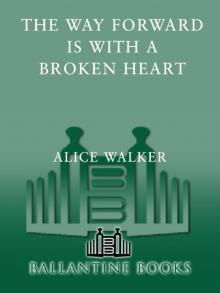 The Way Forward Is With a Broken Heart
The Way Forward Is With a Broken Heart Meridian
Meridian Revolutionary Petunias
Revolutionary Petunias A Poem Traveled Down My Arm
A Poem Traveled Down My Arm Once
Once Horses Make a Landscape Look More Beautiful
Horses Make a Landscape Look More Beautiful Living by the Word
Living by the Word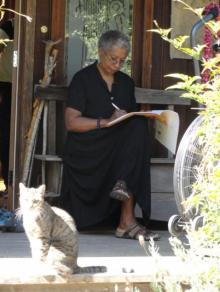 In Love and Trouble
In Love and Trouble The Color Purple Collection
The Color Purple Collection Now Is the Time to Open Your Heart
Now Is the Time to Open Your Heart Color Purple Collection
Color Purple Collection Taking the Arrow Out of the Heart
Taking the Arrow Out of the Heart The World Will Follow Joy
The World Will Follow Joy Meridian (1976)
Meridian (1976) Absolute Trust in the Goodness of the Earth
Absolute Trust in the Goodness of the Earth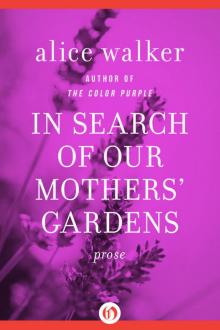 In Search of Our Mothers' Gardens
In Search of Our Mothers' Gardens